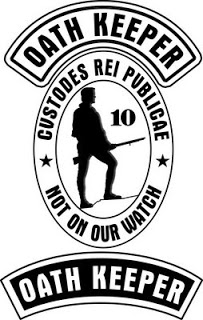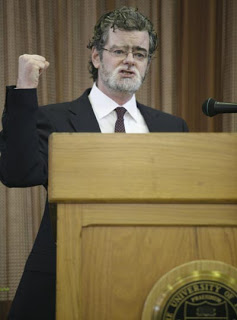Friday, October 23, 2009
End the Occupation: A Mission for the Oath-Keepers
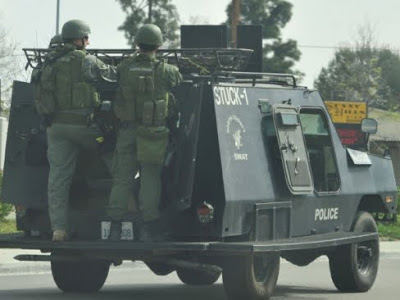
One Nation, under Occupation: Police departments nation-wide are acting as if this were a conquered country, and as if citizens were “enemy combatants.”
A thin blanket of early evening darkness had draped itself across Alex Locklear’s home in Maxton, North Carolina when the armed intruders arrived.
Brandishing firearms, the invaders forced several people — including wheelchair-bound Nicholas Locklear and a pregnant woman — to the ground and then barged in through the rear door, threatening to “blow the brains” out of anyone who put up a struggle. One woman was so terrified that she fled, tripped over an unseen obstruction, and broke her arm.
The arrival of an unmarked police car with its blue running lights flashing must have provided the victims of the home invasion with a moment’s relief. But that relief would have quickly turned to a different flavor of alarm when the victims realized that their assailants were the police.
Under the pretext of a drug search, the five-man robbery crew ransacked the Locklear home in search of large amounts of cash that could be “forfeited” — that is, stolen — as alleged drug proceeds. The robbers had to be content with the $200 they found in Alex Locklear’s bedroom, which is all they could put their hands on before piling into the police car and pulling away with such reckless haste that the vehicle shed one of its front hubcaps.
Locklear, who returned shortly after the robbery, reported the crime to the Robeson County Sheriff’s Office, giving descriptions of the assailants and their vehicle. Not surprisingly, the Sheriff didn’t follow up on that solid lead, because the robbery had been spearheaded by Robeson County Deputy Sheriff Vincent Sinclair, a member of the department’s drug enforcement unit.
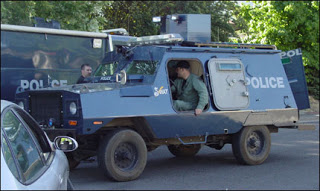
The chances are pretty good that as you read these words, paramilitary attacks — commonly described as “no-knock raids” — are either being planned or executed somewhere in the U.S. Typically carried out by the military units called SWAT or tactical teams, those raids are generally triggered by a tip from a “confidential informant” — a paid snitch — and subsidized with federal funds, often through the “Justice” Department’s Byrne Grant program.
Ironically, those on the receiving end of such “authorized” assaults are often treated even worse than the victims of the raid on the Locklear home.
No recourse: Last August, a SWAT team in Anderson, Indiana destroyed Barbara Williams’ home in a mistaken armed raid. According to the city attorney, since the assault was “legal,” the city is not liable for the damages, and the now-homeless Mrs. Williams is just S.O.L.
When property is damaged or innocent people are injured or killed in the course of an “authorized” home invasion, police can generally expect to be held blameless, since any action they perceive as a potential threat supposedly justifies the use of deadly force.
Witness the case of 22-year-old Houston resident Pedro Oregon Navarro, who was murdered by police who invaded his family’s home in a mistaken “no-knock” raid. Navarro, who had armed himself with a handgun to deal with belligerent intruders he didn’t know were police, was shot twelve times.
According to Harris County District Attorney John B. Holmes, Jr., the violent death of Navarro at the hands of the police was not a crime, because “the law does not allow anyone to resist arrest, even an illegal one” — and that therefore Navarro’s murderers “had a right to use deadly force … if he threatened them.”
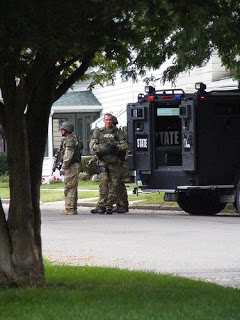
Holmes is a prosecutor, so it’s not surprising that he lied about the right to resist an illegal arrest. But his assumption that police have the “right” to kill anyone who resists is almost universally shared within both law enforcement and the “Justice” system.
Apparently, Deputy Sinclair and his gang didn’t realize the extent of their official impunity: Had they known that they had the “right” to kill anyone who resisted their illegal invasion, it’s likely that someone would have died at the Locklear home.
Like many corrupt police in such circumstances, however, the raiders left a relatively light footprint, most likely out of concern that leaving a corpse or two behind would lead to compromising questions. If their paperwork had been in order, they wouldn’t have had to display such restraint.
The attack on Alex Locklear’s home was just one of scores or hundreds of violent crimes committed by police in Robeson County, North Carolina committed over nearly a decade beginning in 1995. A federal investigation calling itself “Operation Tarnished Badge” eventually produced the conviction of some 22 police officers and Sheriff’s Department personnel, including former Sheriff Glenn Maynor.
Deputies assigned to narcotics duty committed a string of crimes, some of them acts of state-sponsored terrorism — such as fire-bombing homes of suspected drug dealers, or hiring arsonists to burn down the homes of personal enemies. On one occasion, a deputy doused a recalcitrant suspect with lighter fluid and set him on fire. Drug dealers who cooperated were protected from prosecution; one was even given a gun and a police uniform and permitted to take part in a raid.
Hundreds of thousands of dollars were stolen from people under the pretext of drug asset “forfeiture,” with much of it skimmed away for personal use without being reported. District Attorney Johnson Britt noticed a bloc of deputies who were living beyond what he assumed to be their means: They bought boats or other expensive recreational vehicles, took cruise ship vacations together, even went in as a group for Lasik eye surgery.
What really rankled Britt, however, was having hundreds of drug cases dismissed because of the incompetence and corruption of drug enforcement officers in Robeson County. After all, how could a prosecutor make a name for himself if his drug cases — the bread-and-butter of his profession — kept being dismissed?
Britt contacted the Feds, and soon enough the Feds discovered that the Robeson drug cops were skimming from the profits of the local forfeiture racket. Presumably, if the cops had been faithfully reporting their haul and content with the kickback the Feds provided, or even if their corruption had been contained and relatively modest, the Feds wouldn’t have intervened. As it happens, however, dozens of Robeson cops and deputies were put on trial for stealing “federal funds” — meaning the cash that was seized at gunpoint from people suspected, but not convicted, of drug-related offenses.
What happened in Robeson County in the years between 1995 and 2002 (when “Operation Tarnished Badge” began) was hardly exceptional. There are many other jurisdictions in which, thanks to the federal “War on Drugs,” local Police and Sheriff’s Departments have mutated into robber gangs.
For several years, Brian Gilbert, Sheriff of Iowa’s Dallas County, ran a very lucrative theft ring. Dallas County sits astride a very well-traveled stretch of I-80, the country’s major east-west interstate. Gilbert and his deputies preyed heavily on people driving late-model SUVs with out-of-state license plates — particularly drivers who appeared to be of Latino extraction.
Stopped for alleged traffic infractions, the drivers would be threatened with prosecution for drug-related offenses — such as “money laundering” — if they were found to be in possession of significant amounts of cash. That trouble could be avoided if the drivers simply surrendered their vehicles and money to the county.
This little scam netted millions of dollars, and might still be in operation today had Gilbert not gotten a bit too greedy: He was caught taking home several paper sacks filled with money that had been stolen during a traffic stop. For this act of felonious grand larceny, Gilbert lost his job and was given a suspended ten-year prison sentence, along with five years’ probation.
Police in Kingsville, Texas have been more disciplined than Gilbert and his gang in Iowa. Because that tiny town is located along Highway 77, a route often used by suspected drug couriers, police have been able to confiscate millions in putative drug proceeds, with eighty percent of what they steal going directly into the city budget. This is why the exceptionally well-paid police in that town of 25,000 have tricked-out high-performance cop cars and all the latest digital toys.
It’s important to italicize the fact that the people from whom this money is stolen have not been convicted of crimes — or even, in most cases, formally accused of crimes. All that is required is the presence of a large amount of cash coupled with an assertion by self-interested law enforcement officers that there is a suspected “nexus” to drug activity of some kind.
A recent federal court decision (entitled — I’m not kidding — United States of America v. $124,700, in U.S. Currency) held, in effect, that traveling with a large amount of currency offers sufficient probable cause to justify a narcotics-related forfeiture. Once the proper incantations are uttered and the requisite paperwork is filled out in the typical tax-feeder’s sub-literate scrawl, the money itself is found “guilty” and taken into government custody.
Police and prosecutors in Tenaha, Texas — a town in Shelby County bordering Louisiana — have added some innovative wrinkles to the familiar forfeiture racket. A current federal lawsuit describes how Tenaha police have refined to a science the practice of targeting motorists — generally “racial and ethnic minorities, and those in their company” — for unjustified traffic stops, during which they are questioned as to “whether they have money or valuables” and then subjected to illegal searches.
Should money or items of value be found, the motorist and passengers are then placed under arrest for “money laundering” or drug-related charges, and then given an ultimatum: Sign away their property or face prosecution. This form of extortion-robbery is particularly effective when the victim is carrying an abnormal but relatively small amount of cash — say, less than $5,000 — that wouldn’t be enough to compensate for the hassle and expense of mounting a legal defense.
In one of the cases described in the lawsuit, an individual named Danny Green who works as an investigator for the Shelby County Prosecutor’s Office threatened to kidnap a couple’s children if they didn’t sign a document surrendering about $6,000 in cash.
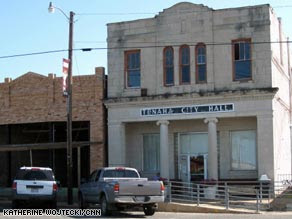 Den of thieves:
Den of thieves: George Bowers, the superannuated mayor of Tenaha, insists that the seizures are justified not because of a compelling law enforcement need, but because his municipal government needs the money.
Oh. Well, then — why not?
Why bother trying to cultivate a local economy when there are innocent motorists to shake down?
To understand the depth of cynical corruption that exists in Shelby County, consider the reaction of District Attorney Lynda Russell to the lawsuit: She sought official permission to use forfeited funds to defend herself from charges that she had illegally confiscated those same funds.
Nope, that isn’t David Allen Coe: This vision of feminine refinement is Shelby County District Attorney Lynda Russell (a Republican, natch), a Queenpin (as it were) of the county’s forfeiture mob.
If this kind of thing were taking place only in isolated, one-stoplight, speed-trap towns like Tenaha — places where the local government is the malodorous residue at the bottom of a very shallow gene pool — it would be disgusting, but avoidable.
But this kind of outright larceny under color of “law” is underway wherever the Feds have fomented an official crime spree in the name of the “war on drugs.”
We really shouldn’t perceive the “war on drugs” in metaphorical terms. This is an actual war, albeit one that targets individual liberties, rather than illicit commerce.
Thanks to this war, innocent people are frequently terrorized by military assaults on their homes, and injured or even killed without legal consequence. It’s because of this war that travelers have a fully justified fear of being illegally detained and robbed at gunpoint by people in government-issued costumes.
That homefront war inspired “exceptions” to the posse comitatus law to permit the hands-on involvement of the military in domestic law enforcement. Even more alarming is the fact that it led directly to the federalization and militarization of law enforcement — which means that the police themselves are, in effect, an army of occupation right now.
This state of affairs suggests a vitally important mission for the movement called “Oath Keepers” — an association of retired and active-duty law enforcement and military personnel who define their allegiance in terms of fidelity to the Constitution, rather than loyalty or obedience to political officials.
As men committed to the Constitution, Oath Keepers have made it clear that there are at least ten specific kinds of orders they will not obey — orders to disarm American civilians, conduct warrantless searches, blockade or interdict American cities, invade and subjugate states that assert their reserved powers and constitutional sovereignty, subject citizens to military tribunals, enforce martial law decrees, or otherwise undermine or infringe upon the constitutionally guaranteed individual rights of Americans.
Oath Keepers founder Stewart Rhodes explains that Oath Keepers will stand down rather than carry out such illegal orders, and be prepared to defend law-abiding citizens against the aggression of a lawless government. Predictably, Oath Keepers has been identified as a domestic enemy by Morris Dees’ for-profit Stasi, the so-called Southern Poverty Law Center (SPLC).
During a recent installment of Chris Matthews’ cable television program, Matthews and SPLC apparatchik Mark Potok did their level best to contort comments made by Oath Keepers founder Rhodes into an endorsement of insurrectionary violence.
Matthews, who appears to be bucking for a Daytime Emmy, theatrically feigned incredulity that any responsible person could believe it possible that concentration camps could be erected on American soil — ignoring such trivial matters as the WWII-era detention of Japanese-Americans and the hideous treatment of American Indians during the 19th Century. For his part, Potok insisted that Oath Keepers were cultivating terrorism by spreading alarmist rhetoric about the possibility of martial law.
Bear in mind that the SPLC’s core fund-raising activity consists of hitting up elderly donors with appeal letters that traffic in alarmist rhetoric that treats the tiny, inconsequential white supremacist movement as nothing less than the Fourth Reich on the March.
To judge from the SPLC’s standard spiel, the most significant threat to individual rights comes from toothless cretins in Klan regalia and socially inept Nazi wanna-bes with man-boobs. Meanwhile, black Americans, Latinos, and other people for whom the SPLC displays such supposed solicitude are being terrorized by armed government officials who are carrying out a very literal war within our borders.
This presents Oath Keepers with a splendid PR opportunity that should become one of its most important ongoing campaigns: Why doesn’t that organization reach out to another estimable group, Law Enforcement Against Prohibition, in demanding an end to the “war on drugs”?
Most of the unconscionable acts and policies the Oath Keepers oppose — wholesale violation of individual rights, detentions, confiscations, civilian disarmament, militarization of domestic law enforcement — are not a vague future possibility, but rather a tangible reality right now because of the “war on drugs.”
Most, but by no means all, of the victims of that war are non-white Americans. It would be entertaining to watching the SPLC try to explain how Oath Keepers could qualify as a “hate group” even as they took up the cause of black and Hispanic Americans suffering official abuse by way of the “war on drugs.”
Valuable as it is for Oath Keepers to inoculate police and military personnel against the prospect of wholesale martial law, the group should be urging such personnel to stand down right now when it comes to carrying out manifestly unconstitutional and anti-American drug war policies.
The Oath Keepers should urge police and Sheriff’s Departments to reject counter-narcotics grants and federal subsidies of any kind, including equipment transfers and other material support from the Pentagon. They should find the honest and principled law enforcement personnel who are mortified by the transformation of so many police and Sheriff’s departments into criminal syndicates through the practice of “asset forfeiture.” And they should take the point in reining in the ever-expanding use of SWAT teams (as a prelude to abolishing them outright, of course).
We’re constantly reminded that “most” law enforcement officers are decent, public-spirited men who are disgusted and alarmed by corruption and the abuse of power. By urging that law enforcement stand down from the “war on drugs,” Oath Keepers could help us learn whether this is actually the case.
(My thanks to several contributors in the comments thread who corrected an error in an earlier version of this essay: I had mistakenly referred to I-85, rather than I-80, as a major east-west interstate highway.)

Available at Amazon.com
Dum spiro, pugno!
Content retrieved from: http://freedominourtime.blogspot.com/2009/10/end-occupation-mission-for-oath-keepers.html.



